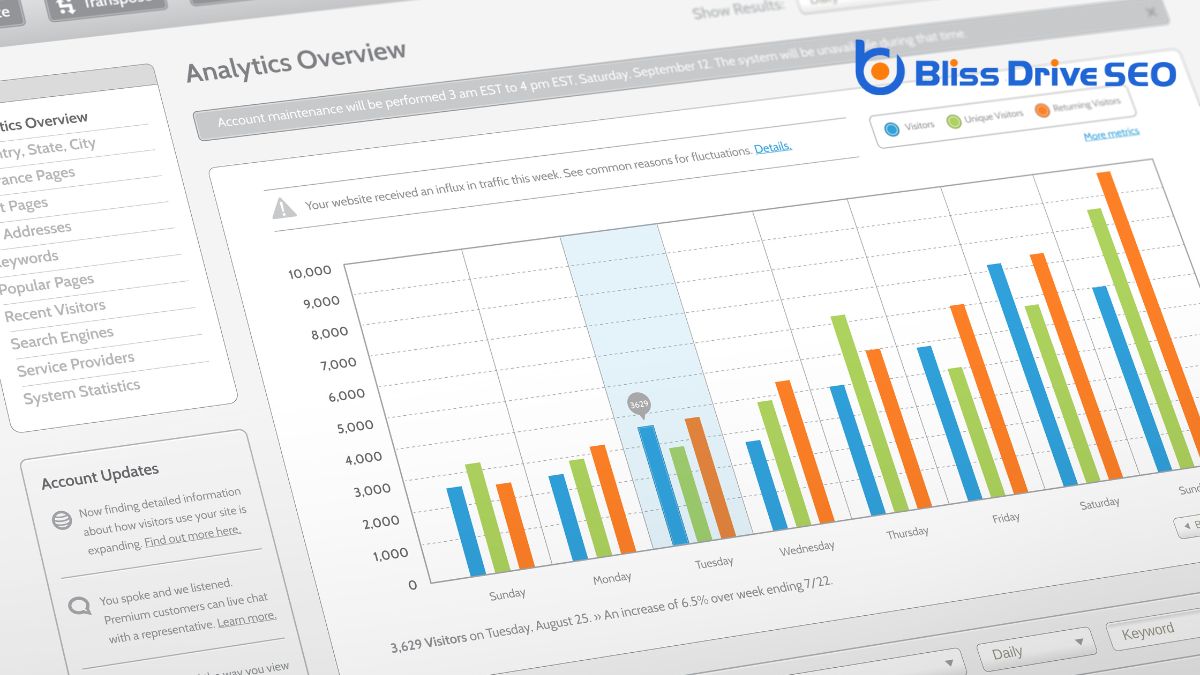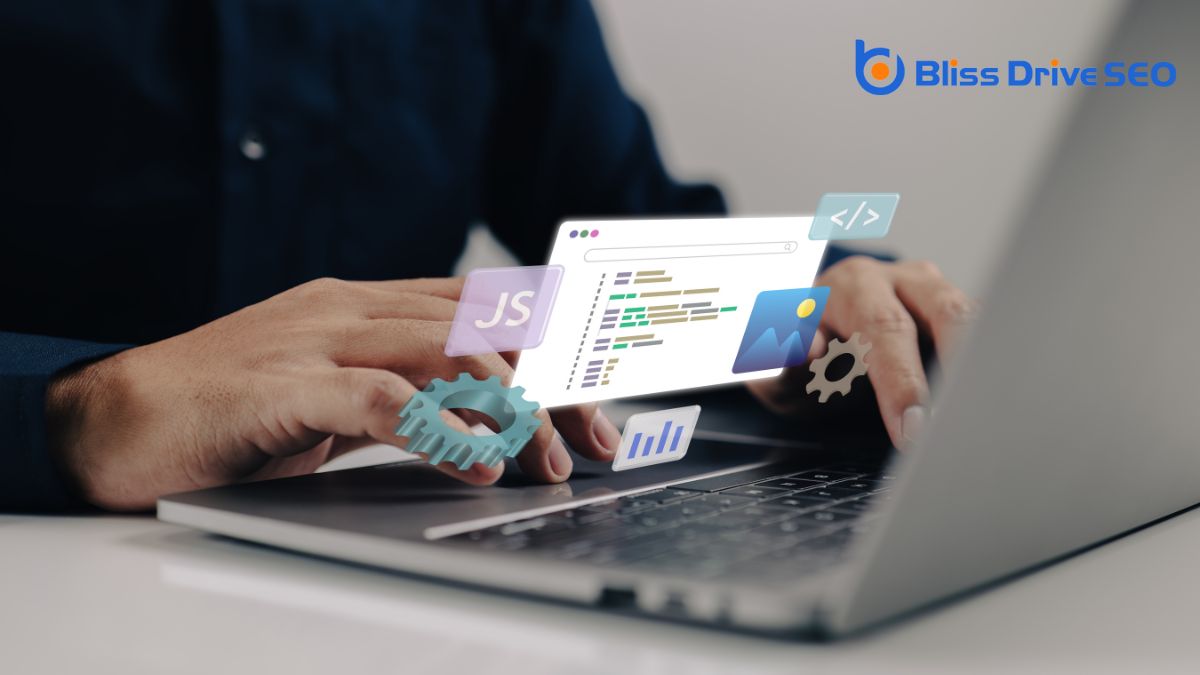Digital Marketing Services
Learn More About Us

To achieve higher search rankingsThe position at which a website appears in the SERP., start by optimizing on-page SEOOptimization techniques performed directly on the website, including content and HTML source code. with high-quality, updated content and make sure your site is mobile-friendly and loads quickly. Use LSI keywordsWords or phrases that users type into search engines to find information. naturally to add semantic depth without keyword stuffingOverloading a page with keywords to manipulate search engine rankings.. Align your content with user search intentThe purpose behind a user’s search query. to boost relevance. Building quality backlinksLinks from other websites pointing to your website, crucial for SEO. from reputable sites can greatly enhance your website's authority. Finally, monitor your SEO performance using Google AnalyticsA web analytics service offered by Google that tracks and reports website traffic. and Google Search ConsoleA tool by Google that helps monitor and maintain your site's presence in search results. to refine strategies effectively. Explore these methods to discover how each can elevate your search rankings further.

Optimizing on-page SEO is like fine-tuning a car engine; it guarantees everything runs smoothly and efficiently. Start with creating high-quality content that aligns with search intent. Understand what your audience is looking for and tailor your content to meet those needs. Doing so improves user engagementThe level of interaction and involvement users have with social media content. and boosts your search rankings.
Ensure your site is mobile-responsive. With an increasing number of users accessing content on mobile devices, your site must offerThe specific product or service being promoted by affiliates. a seamless experience. Poor mobile responsiveness can hurt user engagementThe interactions that users have with a brand’s content on social media. and, consequently, your organic trafficVisitors who come to a website through unpaid search engine results..
Site loading speed is another critical factor. A fast-loading site keeps users engaged and reduces bounce rates, positively impacting your search rankings.
Regularly update and refresh your content to signal relevancy to search engines. This practice attracts more organic traffic and keeps your audience coming back for more.
Don't forget to incorporate LSI keywords naturally throughout your content. These keywords help search engines understand your content's context, improving its relevance and boosting on-page SEO. By focusing on these aspects, you'll create a user-friendly website that ranks higher and attracts more organic traffic.
To further enhance your on-page SEO efforts, let's focus on using LSI (Latent Semantic IndexingThe process of adding web pages into a search engine's database.) keywords. These related terms help search engines confirm the relevance of your content. By incorporating LSI keywords, you improve on-page SEO and assist Google in understanding the context of your topic.
LSI keywords add semantic richness to your content, making it appear more inclusive to search engines. This not only enhances your content's visibility but also signals its relevance.
A diverse content strategyA plan for creating, publishing, and managing content to meet business goals. that includes LSI keywords reduces the risk of keyword stuffing, ensuring your content remains natural and engaging.
When you strategically use LSI keywords, your content becomes more contextually pertinent. This boosts your chances of appearing higher on search engine results pages.
The key is to weave these related terms naturally into your content so that it feels organic and informative to your readers.
Understanding and matching search intent is crucial for achieving higher search rankings. When you align your content with what users are searching for, you increase its relevance to their queries. Google prioritizes content that meets the searcher's intent, so focusing on this can greatly boost your SEO strategy.
Start by analyzing the search intent behind your target keywords. Are users looking for information, trying to make a purchase, or seeking a specific website? Understanding these nuances helps you create content that meets user expectations and matches the type of information they're seeking.
For example, if someone searches for "best hiking boots," they likely want recommendations and reviews, not just a list of products.
Crafting content that satisfies search intent ensures it resonates with your target audience. This relevance makes your content more likely to rank higher in search results. By addressing the needs and interests of your audience, you not only improve their experience but also increase your chances of achieving higher search rankings.
Incorporate your findings into your SEO strategy by tailoring your content to match user queries. This approach will guarantee your content stands out in search results and aligns perfectly with what users are looking for.

Building quality backlinks is an essential strategy for enhancing your website's credibility and authority. Quality backlinks from authoritative websites can greatly boost your search rankings. When other reputable sites link to your content, it's like receiving an "upvote" that signals to search engines that your site is valuable and trustworthy.
To get started with building backlinks, focus on white-hat link-building strategies. These ethical methods ensure you earn high-caliber backlinks that positively impact your SEO efforts. One effective strategy is creating shareable, high-caliber content that other sites naturally want to link to. Blog posts, infographicsVisual representations of information, data, or knowledge intended to present complex information qu..., and research reports are excellent examples.
Guest bloggingWriting and publishing articles on other websites to reach a new audience. is another way to build quality backlinks. By contributing valuable content to other reputable sites in your nicheA specific segment of the market targeted by affiliates to promote products or services., you can earn backlinks that improve your search rankings.
Additionally, consider reaching out to websites that have mentioned your brand but haven't linked to your site yet. A polite request for a backlink can often leadA potential customer referred by an affiliate who has shown interest in the product or service but h... to a positive outcome.
Monitoring SEO performance is crucial to ensure your strategies are effective. By keeping track of key metrics, you can ascertain that your efforts drive meaningful results. Start by using Google AnalyticsThe systematic computational analysis of data or statistics to gain insights and support decision-ma... to monitor organic traffic, page views, and user engagement. This tool provides a wealth of data to help you comprehend how visitors interact with your content.
Leverage Google Search Console to gain insights into your keyword rankings, click-through rates, and impressions. This platform will show you which keywords are performing well and where there's room for improvement.
Additionally, tracking leads and sales conversions is indispensable to measure the ROI of your SEO activities. This helps you determine if your increased traffic is translating into tangible business outcomes.
To get the most out of your SEO performance monitoring, consider the following:
To improve your search ranking, optimize meta tagsHTML tags that provide information about a web page to search engines and visitors., headings, and images. Create high-quality, engaging content with relevant long-tail keywordsLonger, more specific keyword phrases that are less competitive and often more targeted.. Build a strong backlink profile, and regularly monitor your SEO performance metricsKey indicators used to measure the effectiveness of affiliate marketing efforts, such as clicks, con.... Consistency is key.
To rank high in search results, focus on using long-tail keywords, getting high-quality backlinks, updating your content regularly, using structured data markup, and creating engaging content that matches user intent. These strategies will boost your visibility.
You'll achieve better SEO rankings by creating long-form, data-rich, and visually appealing content. Regular updates, aligning with search intent, and using relevant LSI keywords will also boost engagement and confirm content relevance for search engines.
You should create long-form, data-rich, and visually appealing content. Optimize it for user intent, update it regularly, and include LSI keywords. This approach increases relevance and backlinks, making Google rank your content higher in search results.
To boost your search rankings, make sure you optimize on-page SEO and use LSI keywords. Always match your content to search intent and focus on building quality backlinks. Don't forget to monitor your SEO performance regularly to make necessary adjustments. Implement these proven tips, and you'll see your site climb the search results. Stay committed, and your hard work will pay off with better visibility and increased traffic. Keep pushing forward!
